The inkle blog
Editor's Choice!
We still can’t quite believe it. We’re not pinching ourselves, we’re bashing our heads with hardback Folio-society copies of Verne’s classics. 80 DAYS, text-based interactive fiction, is currently Editor’s Choice on the App Store in the UK and US and others, and several thousand people have already completed multiple journeys around the world.
“This is a brilliant adventure based on the adventures of Phileas Fogg, with a whole world to explore, and a script that will hold your attention throughout. Interactive storytelling at its best.” - The Guardian
“Thick with mysteries and opportunities for disaster, Inkle's new title is far more palatable than its source material... 80 Days is a voyage that must be taken.” - The Verge
“Verne fans in particular are going to have a fantastic time with this game, but I think almost anyone is going to find plenty to like in 80 Days.” - Touch Arcade
Going around and around
When we set out to make 80 DAYS we had a few goals - we wanted to tell a great story, with a strong sense of the world it was in. We wanted interactive fiction narrated from an “I” not a “You”. And we wanted to make a game that could be played multiple times.
We didn’t totally believe that was even possible with a narrative game - surely you play to see the story, and then it’s done?
Well: we’ve seen people playing four or five games in a single day, trying to improve their score, or simply exploring the world and its hidden corners.
More there’s still more to find…
But there are still secrets to be unearthed. What’s in the airship into Reykjavik? Will love be waiting for you in London? What’s the secret of the Irktusk harbour-master? Who did kill the Yokohama hover-craft Artificer?
Thanks to the live feed, we’re pretty sure that right now, no-one out there knows. Yet.

80 DAYS!
We’re celebrating in the inkle office, because 80 DAYS has finally been unleashed. Right now, people are boarding trains, steamers, boats; catching malaria, inciting mutinies, sleeping rough and being captured in the jungles of North India and more…
When watching the trailer remember, every line drawn on the globe is a journey, and every journey has a story, and every story has choices, and every choice is remembered…
Reviews are beginning to trickle in too - here’s a few snippets:
“A sublime video game to immerse yourself in... With impressive visuals, a simple yet elegant game design, and a story to tell based on classic literature, 80 Days is an excellent addition to your mobile game library” - The Examiner
“Probably the best example of interactive fiction ever produced” - Pocket Tactics
Jump aboard today, and see where your journey takes you!
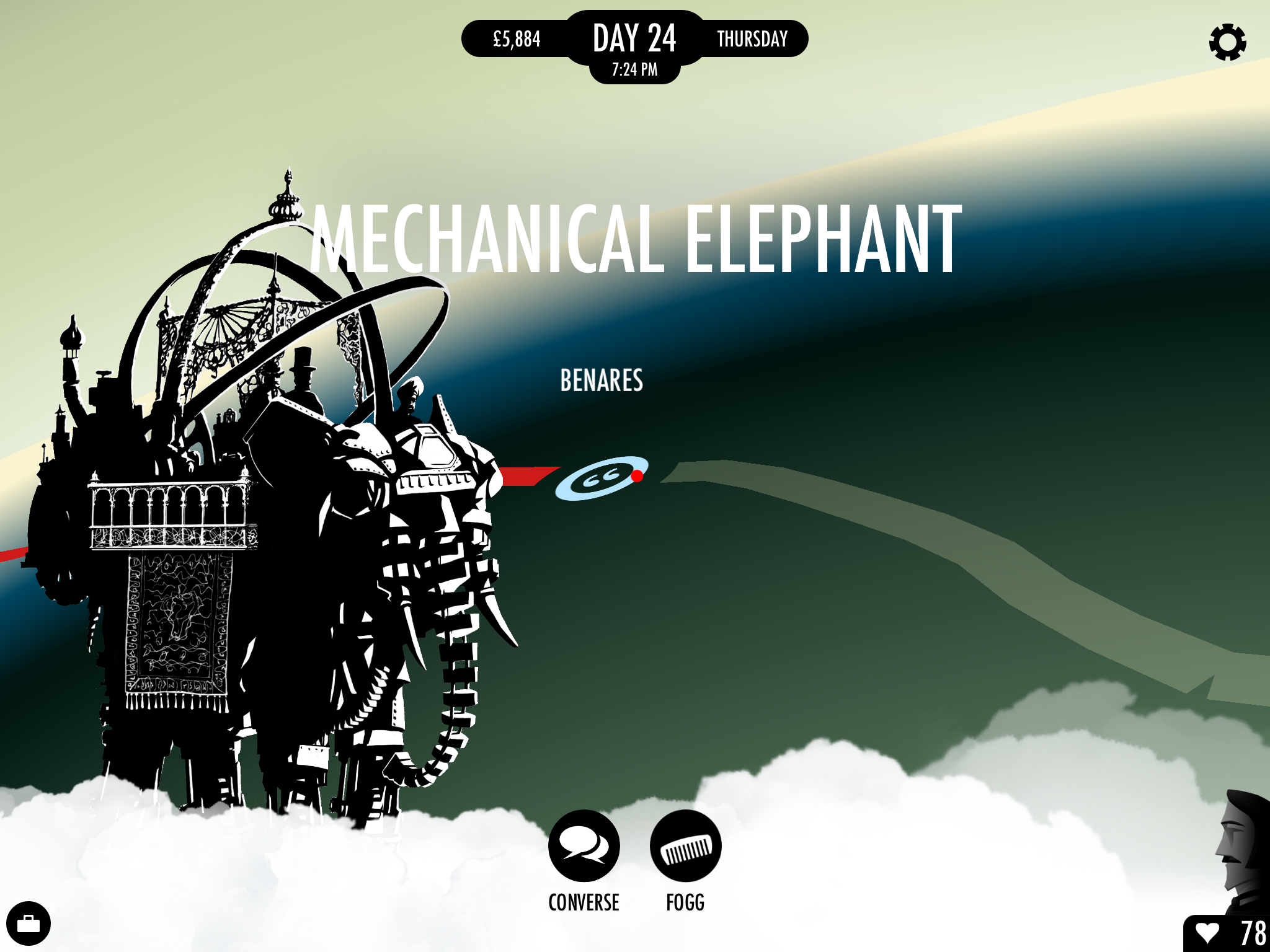

An Unaccountable Delay, Passepartout!
It couldn’t be more ironic: we were beautifully on track to release 80 Days to the world on the 24th - this Thursday. But at the last minute, unforeseen circumstances - exactly the kind which Monsieur Phileas Fogg does not believe in - have scuppered our plans. We will now be launching on July 31st.
The best-laid plans
We had everything in place: review copies have gone out, and we’ve been watching journalists race each other around the world via the live-feed (here’s a time-lapse of that):
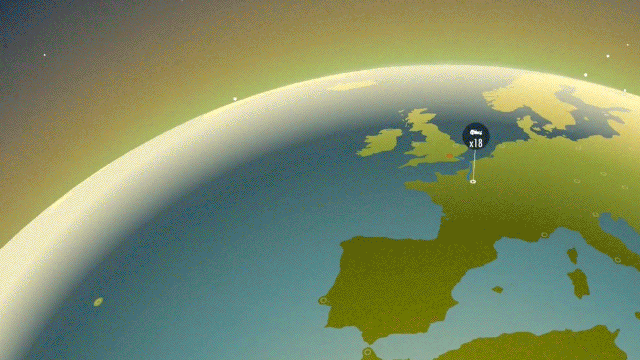
But it turns out this week is one filled with big App Store releases: so big, in fact, we’ve been asked to move 80 Days to next week. That means an extra seven days of waiting for players, and an unbearable extra seven days of nervousness for us, until we find out what you make of the game.
In the meantime…
If you can’t wait that long, here’s a video preview, courtesy of App Spy’s James Gilmour: if you watch on an iPad, you can pretend to press the buttons and imagine the game is out already.
(Coincidentally, you can see James’ playthrough on the animation above: he’s the one, sitting in Paris until Day 7, just scooping up money from the bank while everyone else races on ahead.)

Journey's End...
There’s a point towards the end of a project when it feels like it will never end: when the bug list is three pages long, but every time you fix one, you find two more. There are times when it seems like every line of logic, every piece of art, every element of timing, is capable of going awry if you play the game in just the right wrong way.
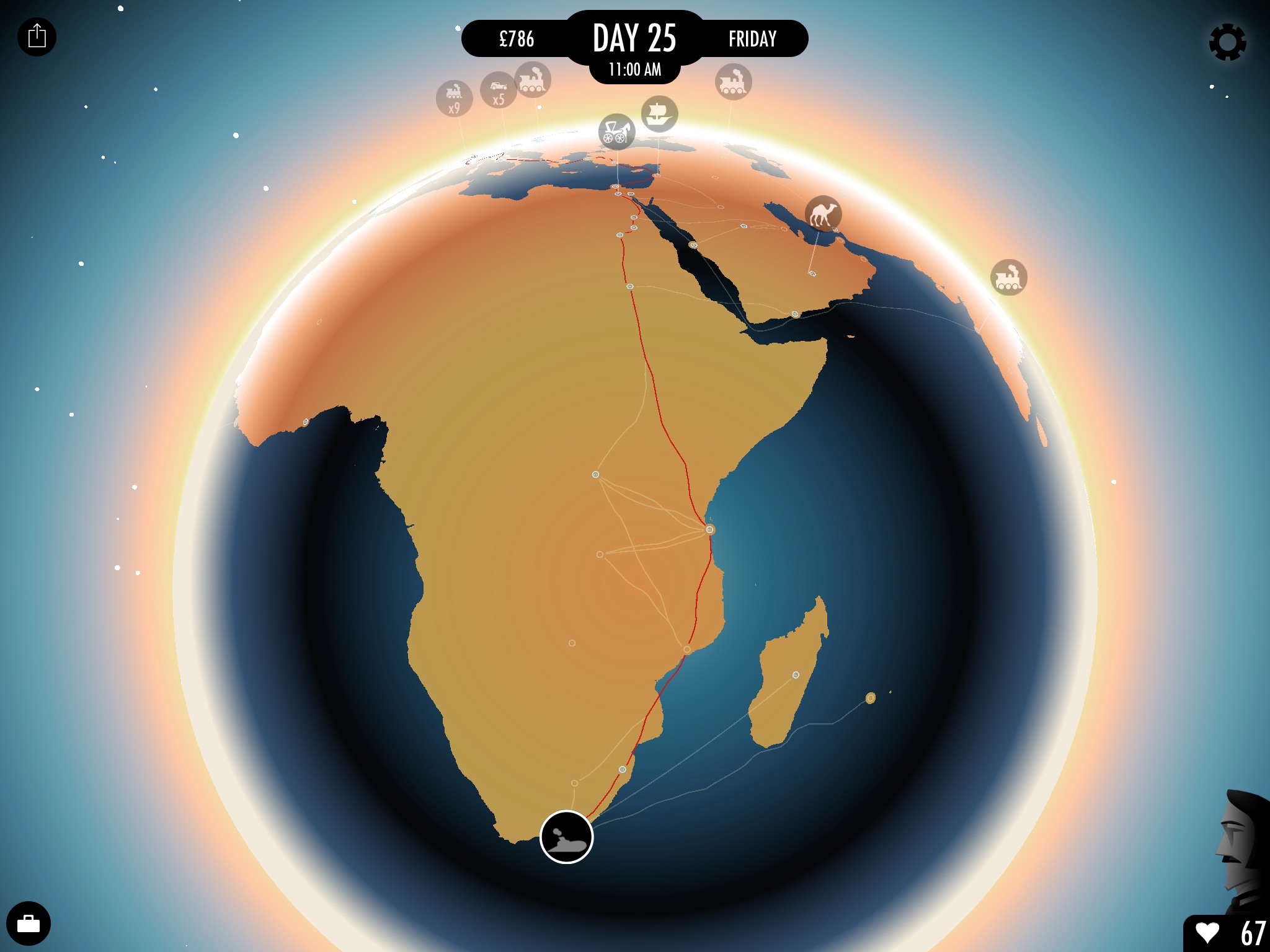
And then suddenly, without any fanfare, everything drops into place. When you step back and realise, it’s finished. There’s always scope for a final snip here and there, of course, but the running is over. Panicking over having too little time transforms into the fear of having too much - there must be something to do, but what is it?
The final pieces!
80 Days has hit that point. It works. All the features we talked about when laying out the concepts last year are in - even those like the real-time clock or the peer-to-peer sharing of routes in progress that we took out halfway through development because we didn’t think they’d be possible. The last cog has gone in, and suddenly, the mechanism turns.

It’s a moment when testing becomes playing. When instead of teleporting to the bit you need to test, you let the sun slowly rise over the Sacré-Cœur in Paris, listening to the bells chiming in the distance, considering your options.
Pulling back, you browse the globe watching other players - beta-testers, and your own past selves - as they race from train to steamer, bribe their way into a Bozek car, or sink in their damaged submersible to the bottom of the Indian Ocean…
The world, turns out, is big
80 Days was intended to be a side-project; something we did while also working on Sorcery! 3. That didn’t happen - this game grew and grew until it encompassed first every working hour, and then every waking one.
Simple ideas - go anywhere, discover routes from the people you meet, buy and sell as you travel to keep yourself funded - turned out to have a hundred interconnections and special cases.
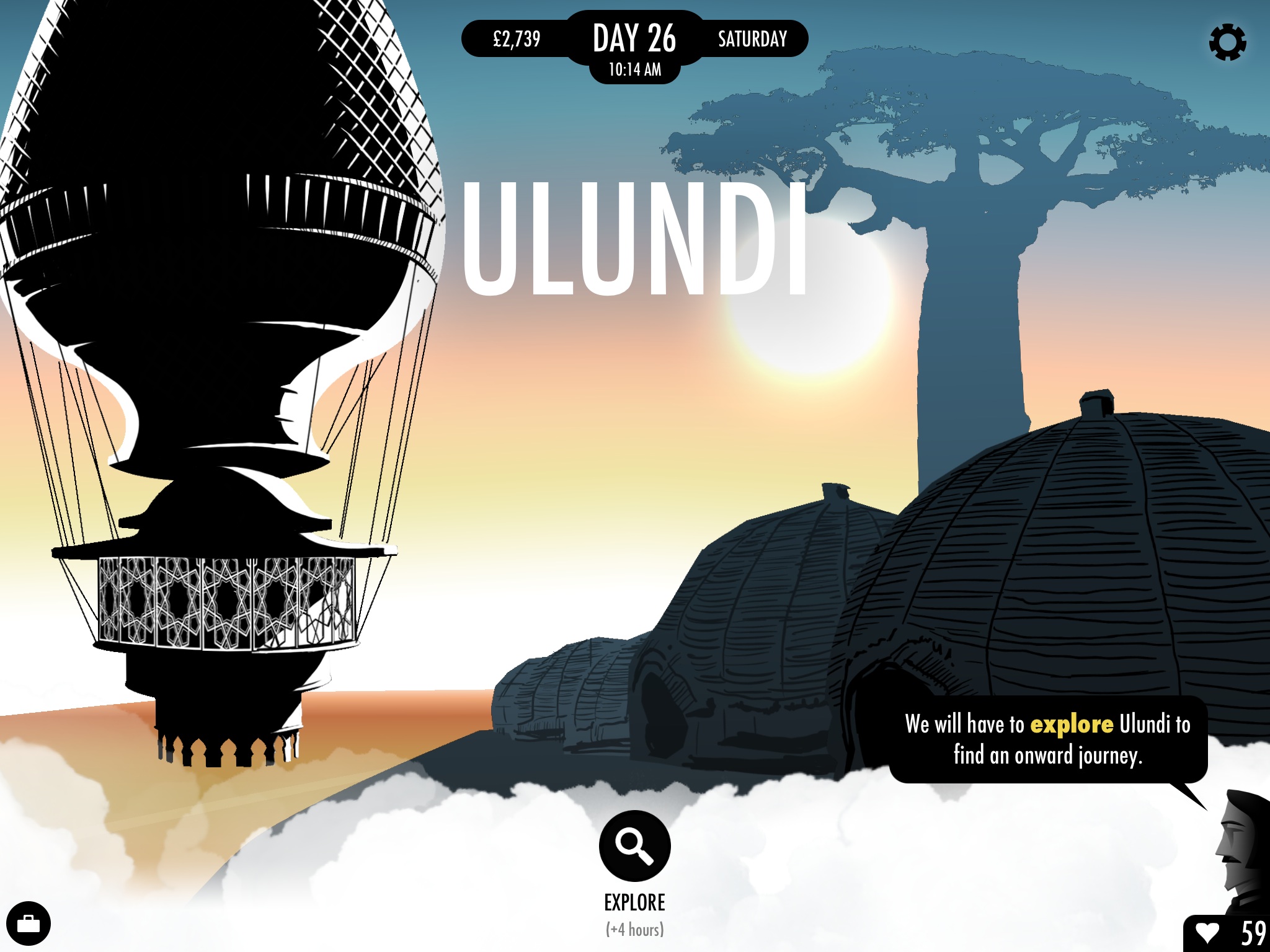
What if you run out of funds in the jungle and can’t afford to hire an elephant onwards? What if you fall desperately ill in a town with no hotels and no doctors? What if you jump off the Trans-Siberian Express, head down into Afghanistan by train, catch the hydrofoil to Astrakhan, the train back to Moscow and re-board the Trans-Siberian to the west of where you get on, what then..?
Sorcery! 2 was our biggest game, four or five times larger than the first Sorcery! part, and hundreds of times more complex in its branching and interlocking paths. 80 Days is a quantum leap in complexity again. It is almost certainly the most intricate branching narrative ever made: even more so, because those branches don’t only arise from what choices you make, but also from when you choose to make them.
Balancing
And then there was the balancing. There are a hundred and fifty cities connected by well over four hundred journeys in and out; each with its own costs, risks and timings. There are over two hundred items you can buy and sell in different markets around the world. But the target - eighty days - is set in stone.
Too hard, and the game would be gruelling. Too easy, and the game won’t present the challenge that’ll make you replay. How do you even begin to balance a game with over half a million words of content, in which no two beta-testers have yet ever taken the same path?

Luckily, Verne helped us out with that one. When our lead writer, Meg Jayanth, started building the world she plotted out the route that Phileas Fogg and valet Passepartout take in the original novel. The adventures along the way are different, spinning out from the original material in unusual and interesting ways - but the timing we kept roughly the same. That was a journey that we knew would take 80 days. Then we just had to make sure all the others balanced against that central spine.
We’ve played the game pretty hard now. My personal best is 65 days, we’ve seen a 49 out there in the wild, as well as a few 90 and 100 day play-throughs. What’s the quickest time possible, though? We have no idea. Maybe you’ll find out for us.
Launching this month!
So when does the game set sail? Right now, we’re holding our breath for Apple to review the game. Once that’s done, we’ll be able to announce our launch date, later this month. If you join our mailing list we’ll email you the day its out (and not before, and not after unless we do a major update.)
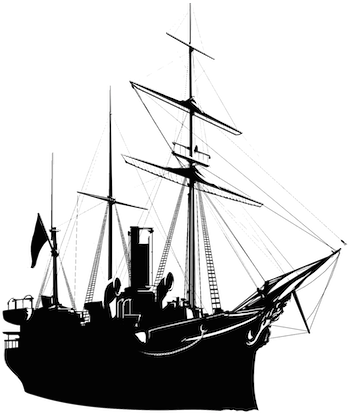

Previews!
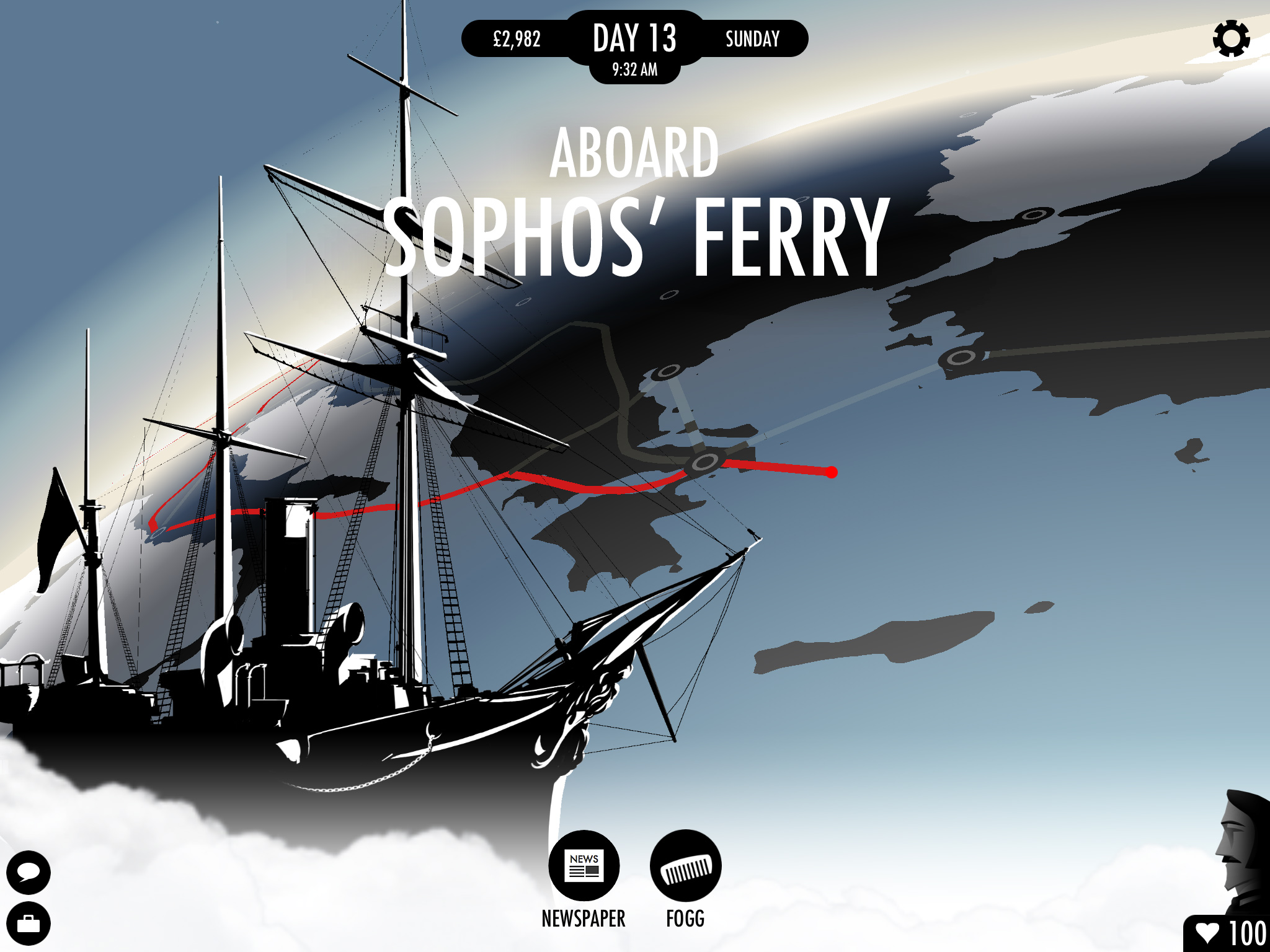
We’ve been working hard to get 80 Days ready for release, doing the final polish to the art, fixing all the little bugs in the interface, entirely rewriting a few major game systems that we’re realised could be a bit better and adding even more cool extra routes, side-alleys, characters and secrets into the text…
…but along the way, we found the time - and the courage! - to send a preview off to some of our favourite reviewers and websites. We’ve been biting our nails to see what they think but first posts have now gone live.

Multiplayer Interactive Fiction
In our last blog-post we posted a video, demonstrating 80 Days. If you watched it, you’ll know that we’ve dropped in one little feature which we think will make the game into something truly special.
The game is a race around the world, and to ensure it feels like a race we’ve added a multiplayer twist.
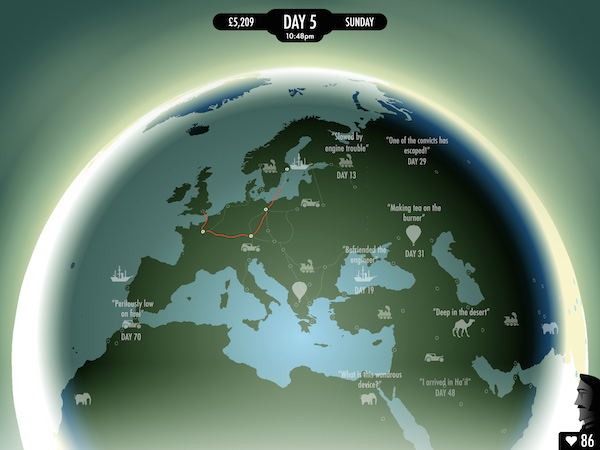

80 Days in action!
We’ve written a bit about 80 Days on this blog, but sometimes it’s hard to really explain what something is, and it’s easier just to show it. So here it is in action!

Verne and Victorian Futurism
This guest post is by Meg Jayanth, author of the script for 80 Days.

Verne was one of the pioneers of science-fiction: his novels mixed wild invention with careful, plausible explanations. His stories imagined the future - but to the modern reader, his visions can be marred by the prejudices and assumptions of the past.
We wanted to take Verne’s sense of exhilaration and optimism about the future, and expand upon his perspective. We wanted to build a world that isn’t comfortably settled into Victorian values, but is as slippery, changing, and as challenging to a contemporary reader as Verne’s works were to his own.
Steampunk is often written as a modern fantasy of an imagined past. We wanted to create something a bit different: a historical fantasy of an imagined future. We call our style Victorian Futurism.
Beyond Victoriana
80 Days is steampunk whose heart doesn’t pump (only) Thames-water: a world shaped by indigenous retrofuturisms in Africa and Asia and the Americas, which resist and disrupt the conventional narrative of history.
We wanted to write steampunk where the automaton armies of the Zulu Federation turn away the depredations of European colonists scrambling for Africa - where the technology that built the British Raj is being used to dismantle its foundations - where the Panama Canal is dug using Haitian ingenuity, tipping the balance of power away from the United States - and where the stories usually told in the margins spill over into the text, and half of them belong to unexceptional women.
We think all this will make our game better, richer, funnier, wilder. We tried to write steampunk which addresses race and class and empire, that goes beyond bustled-and-corseted nostalgia. To build a hungry, radical, fantastical world. Writing historically shouldn’t be an excuse to fetishise outmoded ideas, but to invent better ones.
The year is 1872.
Welcome to the future.

Welcome to our World!
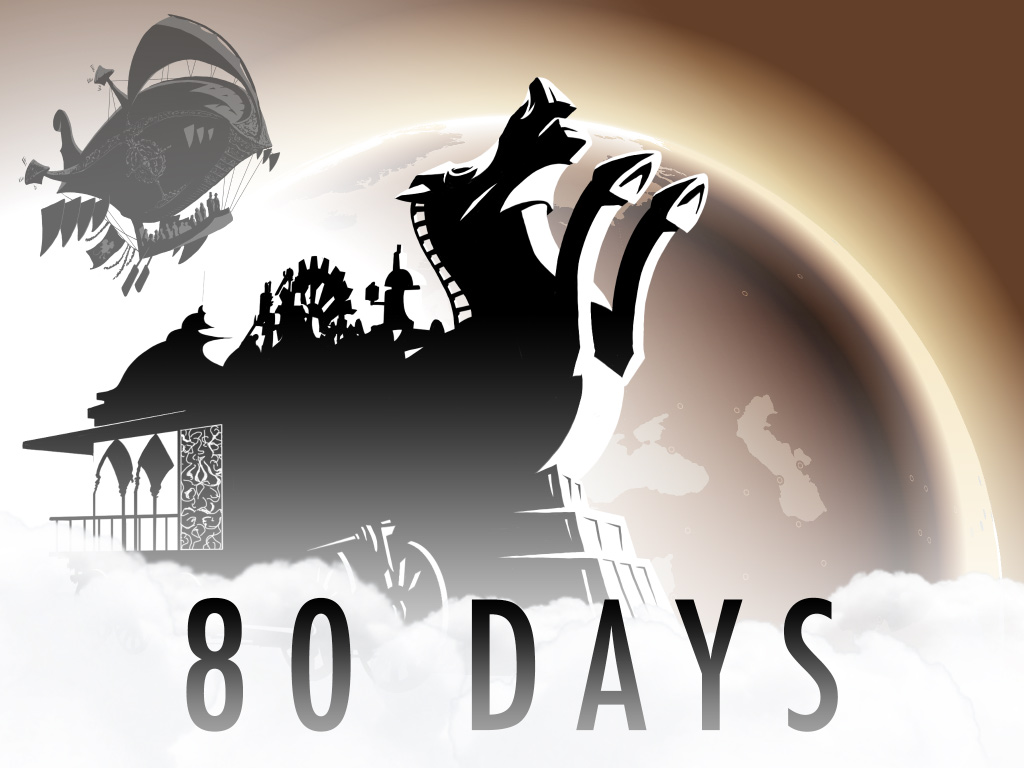
Only eighty days, now that the section between Rothal and Allahabad, on the Great Indian Peninsula Railway, has been opened…
At the start of Around the World in Eighty Days, a newspaper report about the completion of a new railway line is the trigger that sends Phileas Fogg on his race to circumnavigate the globe.
And at the time that Verne was writing, there was only one way the trip could be made in such a short time: through the newly-opened Suez Canal, across the heart of India, and then across America by railway.
But for our version of 80 Days, we wanted the player to be able to go anywhere, visit any city on the globe, and build their own route. Which meant we couldn’t set the game in 1872. Or at least, not the 1872 that Verne knew.
So instead, we’ve created an 1872 Verne might have dreamed of…
Trains, Balloons… Airships, Hydrofoils… Gyrocopters, Steam-cars…

Perhaps you will begin your journey on the newly-built Orient Express, travelling in style from Paris to Istanbul. From there, you could change to a Roziere hot-air balloon for the three-day journey to Beirut, where steam-ships travel to Alexandria, airships ply routes into Mesopotamia, and an ingenious steam-car powered by the heat of the sun runs the old road to Baghdad through the ruins of an ancient Sumerian city…
Or perhaps you’d rather travel north, taking the hydrofoil from Amsterdam to the city of Kristiania - now Oslo - before heading into Russia, where the Trans-Siberian Express crosses the Steppes at super-high speed, powered by magnetic induction?
Or why not travel down through Africa, swapping Ottoman Gheyik airships for the mighty copper-and-tin balloons which can cross the Indian Ocean in a few days…?
There are hundreds of ways to travel, and hundreds of thousands of ways around our world.
Will you make it back to London in time? Care to bet?

So what is 80 Days?

Two weeks ago we posted an annoucement of our next game, 80 Days, where we described it as “part interactive fiction, part globe-based board-game”. (We also said it was a real-time, location-based game, but that was nonsense.)
So what does exactly do we mean?
An adventure begins

inkle exists to experiment with ways to create rich, immersive stories which place the player right in the action, whatever and wherever it may be: where every movement, every line of dialogue and every choice are made by you, and remembered for the rest of the game.
With Frankenstein those choices formed a relationship with the novel’s protagonist - and with Sorcery they took you on a dangerous, fantastical journey.
Now, in 80 Days, we want to blend those two approaches and in Verne’s classic tale of gentlemanly adventure we’ve found the perfect inspiration. 80 Days will take you on an adventure around the entire world, starting on Tuesday 1st October, 1872 and ending - if you play your cards right - eighty days later.
But unlike in Verne’s novel, where you go on this journey is up to you.
An entire globe of content
At time of writing we’re up to nearly two hundred different cities to visit and explore, covering Europe, Russia, India, Africa, South America, the Pacific Islands… and the network of journeys between them is a crazed spiders’-web of steam-boats, balloons, trains, yachts, camel-trains, elephants, carts and carriages…
And every day of every journey forms part of the story, with risks to take, people to meet, situations to overcome - and consequences, both good and bad. Crossing the date-line will be the least of your troubles!
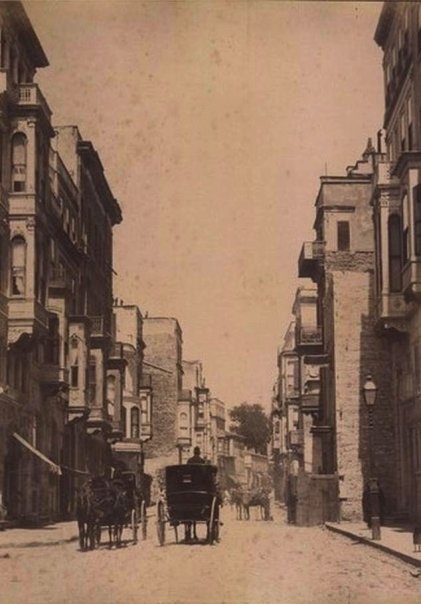
It’s all been meticulously researched: our author, Meg Jayanth, has a folder with hundreds of web-links, images, documents and transcripts. From first-hand accounts of the Trans-Siberian express to the religions of the Ottoman Empire via the slave-trade and the colonial opium trade, we want our journey to be authentic - more so even perhaps than Verne’s original work.
One more last thing
With all that said, there’s one thing we haven’t yet told you about the world of 80 Days. We’ll be revealing more soon, but for now – the clues are all here…


